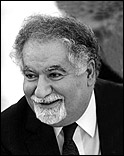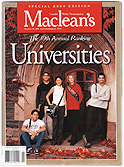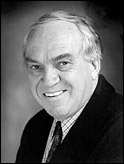on campus
A plea and a promise
In a presentation yesterday to managers and professionals attending an all-day symposium organized by Management Forum, Principal Bernard Shapiro called on his audience to work harder on behalf of students. In turn, he promised that the University would do more to recognize the contributions they make to keeping this place running.
"We simply must pay more attention to students," Shapiro told the crowd, saying that the University as a whole isn't always particularly good at it. Shapiro stressed that he wasn't pointing the finger at non-academic staff alone; faculty and the administration itself are also culpable.
Ensuring that students have a good experience at McGill is essential, said the principal.
He urged staff "to go the extra mile" for students "no matter how busy you are."
Shapiro said the administration was looking at a number of ways to reward non-academic staff for the work they do. About $250,000 will be set aside in next year's budget to create a staff development program that will look at using sabbaticals and other means to recharge the batteries of staff.
A new University-wide staff excellence award will be created to shine a spotlight on outstanding staff.
An exchange program with other institutions is also being seriously considered; staff might be sent to a university on the west coast for a few months to pick up some new skills, with their counterparts coming to McGill as part of a job swap.
Vice-Principal (Administration and Finance) Morty Yalovsky discussed how the administration is keen to commit more dollars to renewal for administrative and support staff.
But there are two complicating factors, Yalovsky said.
One is that, even though McGill will be receiving more funding from the Quebec government in coming years, the precise dollar amounts are still uncertain.
The second factor is that the University also wants to re-examine the compensation that non-academic staff receive. Depending on what McGill can afford to do, that could result in a hard choice: either paying higher salaries to the people who are already here or hiring more people.
A chip off the old book?
 Vartan Gregorian
Vartan Gregorian |
|
Anyone who uses a university library knows that the microchip has imposed mega changes on the library. But the changes don't appear to have been to replace the book by the computer, as the doomsayers chanted two decades ago. Nor does the personal computer seem to have made the library redundant. University and public libraries alike hardly lack for clientele.
What then has the computer age done to the medieval institution?
Vartan Gregorian, who directed one of the world's largest public libraries, the New York Public Library, from 1981-89, will address that subject this evening in a Beatty lecture entitled "Libraries and Reading in the Computer Age." Gregorian, an Iranian-born Armenian educated in Lebanon before attending Stanford University, has had a long love affair with books, learning and teaching.
"From childhood, the library occupied a major role in my life," he told a Washington Post reporter in 1998. With his BA in history, Gregorian had every intention of returning to Lebanon to teach high school, but with his facility for learning, he decided to complete a PhD, after which began a long career in academia and public service.
After finishing his term as provost at the University of Pennsylvania, Vartan stepped off the academic path to direct the New York library. Speaking to the Post, he recalled that his most important task was "to eliminate the public notion that democracy and excellence are not mutually compatible.
"The New York Public Library was the first to dare to clean itself -- shine its chandeliers, its brass. I called it 'the people's palace.' I have no apologies that it should be beautiful, luxurious, because the people deserve it."
After the library, Gregorian became president of Brown University and, since 1997, has been president of the Carnegie Corporation, which awards more than $80 million annually to projects promoting education and world peace.
The lecture, co-sponsored by the Hamazkayin Armenian Educational and Cultural Society, takes place this evening at 6:30 pm in the Fieldhouse Auditorium, Leacock Building.
We're number four
 |
|
Not much new to report on the Maclean's front.
In its popular annual ranking of universities, published this week, McGill again finishes fourth in the category of medical/doctoral universities. The University of Toronto is in first place again, while the University of British Columbia and Queen's University finished in a tie for second spot.
McGill finished first in its category for the number of students who win awards and tied for first place for the number of out of province students who study here.
The University placed second in its category for the proportion of students who successfully earn their degrees, the number of students with marks that are 75 per cent or better, and for the number of international students who chose McGill.
The University finished third for the number of professors who win awards. McGill didn't do as well as it has in past years in terms of its faculty winning research grants, though. According to Maclean's, we placed ninth for social sciences and humanities grants and sixth for medical or science grants.
In other categories, Simon Fraser University was named the top comprehensive university, while Mount Allison University repeated as the number one undergraduate university.
Next year's ranking might produce a more favourable result for McGill, speculates Maclean's assistant managing editor Ann Dowsett Johnston.
There is essentially a one-year gap in what the rankings reflect -- our ranking this year is tied to what we did in 1999. Bolstered by McGill's success in earning new support through the Canada Research Chairs program and the recent $64-million donation to the University by Richard Tomlinson, Dowsett Johnston told The Gazette she wouldn't be surprised to see McGill do better in next year's rankings.
On the move
Professor Gordon Bloom recently joined the Department of Physical Education. His research interests include applied sport psychology and pedagogy. In particular, he is interested in team building, the psychology of coaching and sports violence. Bloom has consulted with sport athletes at all levels of competition.
Mr Michael Head has shifted from his position as software systems manager for the Computing Centre to consultant to the Faculty of Arts and the Faculty of Science for the 2000-2001 academic year. His appointment is half-time in each faculty. Head's expertise bridges information technology and university teaching. He is available to assist faculty on the use of computer technology in courses and administrative staff on software and networking issues, including Banner and web page development. He can be reached at 3707 or by email at michael.head@mcgill.ca.
Professor Kathleen Glass is the new director of the Biomedical Ethics Unit. Her research interests include ethical and legal issues relevant to children, the elderly, psychiatric patients and research subjects, with a particular interest in genetic issues. She is the clinical ethicist at the Montreal Children's Hospital.
Professor Jin Nam Choi recently joined the Faculty of Management as an assistant professor. Choi's teaching specialties include organizational behaviour, team performance and innovation management. Choi has studied employees' use of innovations in business organizations, problem-solving by groups and team performance under crisis, and the group's social influences on its members' attitudes and behaviour.
Professor Nina Spada, an expert on second language learning who worked in the Faculty of Education, has left McGill to join the University of Toronto.
Professor Broadbent
 |
|
When fourth year political science student Mark Flynn caught wind last summer that Ed Broadbent would be teaching a poli sci seminar this term, he leaped at the chance to learn from "someone who had a seat at the table."
Flynn was lucky to get in. There was room for only 25 of the 50 students interested in "Democracy, Rights and the Welfare State," a course that Broadbent has developed over the past three years while teaching at Simon Fraser University and, last year, at Queen's University.
And Broadbent feels lucky to be teaching a course that is an outgrowth of the passion that fuelled his 22 years in politics and, for the past five years, his research. Post-war social and economic inequality and what states do to redress it is what Broadbent studied as a visiting fellow at All Souls College, Oxford University, after leaving the Montreal-based International Centre for Human Rights and Democratic Development in 1996 where he served as the centre's first president.
"That was a turning point for me," says the former leader of the federal New Democratic Party. "I wasn't sure if I would like academia and the Oxford experience was marvellous… Since then, I've been able and fortunate to teach in parallel to my research interest."
Broadbent's return to scholarly endeavour takes him full circle to his pre-politics days in the early '60s, when he taught political science at York University after earning his PhD at the University of Toronto. Only now, of course, he's got a lot more personal anecdotes from his own role in creating laws and policies to alleviate inequality.
This fall, as it turns out, could have been ripe for the retelling of moments of his political past, given the 30th anniversary of the October Crisis, the death of former prime minister Pierre Trudeau and the current election campaign. But Broadbent tries to restrict his personal anecdotes to what is strictly relevant to the course.
When discussing the Charter of Rights, for instance, Broadbent didn't hesitate to give the inside story on how Trudeau secured the NDP's support for the bill by agreeing to include "women's and aboriginal rights, as well as control over our resources."
As for the students, Broadbent finds them "curious, interested and motivated" -- not so different from the students of the early '60s, he says, though "more job-focused." They, in turn, according to Flynn, seem to appreciate both the instructor and his political philosophy. "He's turned a number of students in the class into ardent social democrats."

